
-
 Trump touts trade talks, China calls out tariff 'blackmail'
Trump touts trade talks, China calls out tariff 'blackmail'
-
US judge says 'probable cause' to hold govt in contempt over deportations

-
 US eliminates unit countering foreign disinformation
US eliminates unit countering foreign disinformation
-
Germany sees 'worrying' record dry spell in early 2025

-
 Israel says 30 percent of Gaza turned into buffer zone
Israel says 30 percent of Gaza turned into buffer zone
-
TikTok tests letting users add informative 'Footnotes'

-
 Global uncertainty will 'certainly' hit growth: World Bank president
Global uncertainty will 'certainly' hit growth: World Bank president
-
EU lists seven 'safe' countries of origin, tightening asylum rules

-
 Chelsea fans must 'trust' the process despite blip, says Maresca
Chelsea fans must 'trust' the process despite blip, says Maresca
-
Rebel rival government in Sudan 'not the answer': UK

-
 Prague zoo breeds near-extinct Brazilian mergansers
Prague zoo breeds near-extinct Brazilian mergansers
-
Macron to meet Rubio, Witkoff amid transatlantic tensions

-
 WTO chief says 'very concerned' as tariffs cut into global trade
WTO chief says 'very concerned' as tariffs cut into global trade
-
Sports bodies have 'no excuses' on trans rules after court ruling: campaigners

-
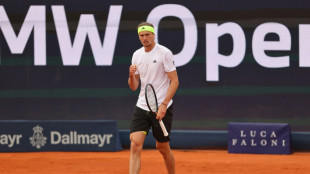 Zverev joins Shelton in Munich ATP quarters
Zverev joins Shelton in Munich ATP quarters
-
The Trump adviser who wants to rewrite the global financial system
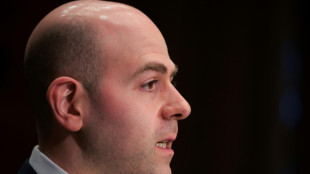
-
 US senator travels to El Salvador over wrongly deported migrant
US senator travels to El Salvador over wrongly deported migrant
-
UN watchdog chief says Iran 'not far' from nuclear bomb

-
 Trump says 'joke' Harvard should be stripped of funds
Trump says 'joke' Harvard should be stripped of funds
-
Macron vows punishment for French prison attackers
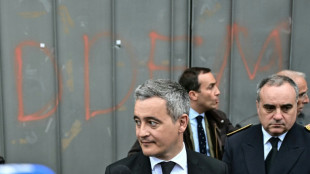
-
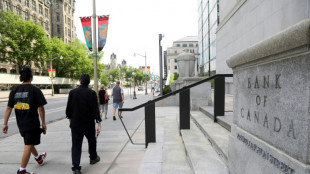 Canada central bank holds interest rate steady amid tariffs chaos
Canada central bank holds interest rate steady amid tariffs chaos
-
Rubio headed to Paris for Ukraine war talks
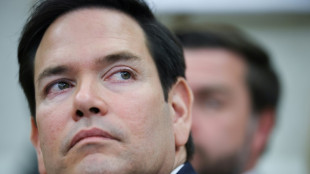
-
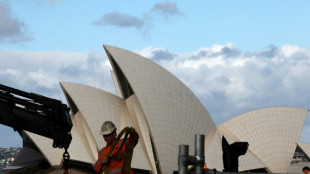 Australian PM vows not to bow to Trump on national interest
Australian PM vows not to bow to Trump on national interest
-
New attacks target France prison guard cars, home
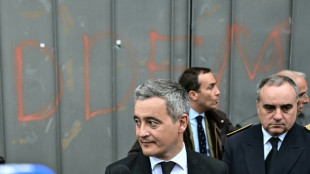
-
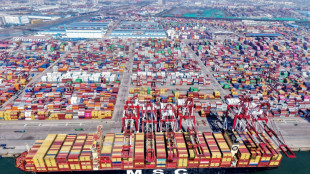 Global trade uncertainty could have 'severe negative consequences': WTO chief
Global trade uncertainty could have 'severe negative consequences': WTO chief
-
Google facing £5 bn UK lawsuit over ad searches: firms
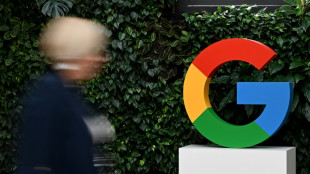
-
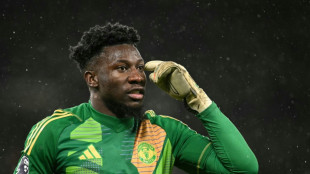 Onana to return in goal for Man Utd against Lyon: Amorim
Onana to return in goal for Man Utd against Lyon: Amorim
-
Tiktok bans user behind Gisele Pelicot 'starter kit' meme
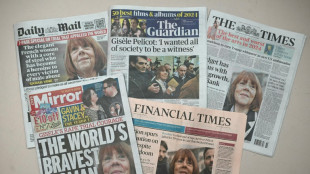
-
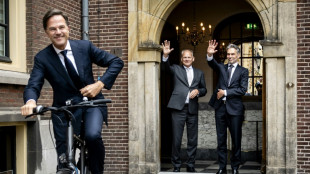 'Put it on': Dutch drive for bike helmets
'Put it on': Dutch drive for bike helmets
-
China's Xi meets Malaysian leaders, vows to 'safeguard' Asia allies
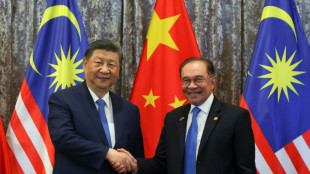
-
 France urges release of jailed Russian journalists who covered Navalny
France urges release of jailed Russian journalists who covered Navalny
-
Gabon striker Boupendza dies after 11th floor fall

-
 UK top court rules definition of 'woman' based on sex at birth
UK top court rules definition of 'woman' based on sex at birth
-
PSG keep Champions League bid alive, despite old ghosts reappearing
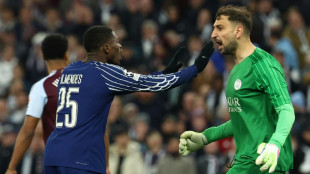
-
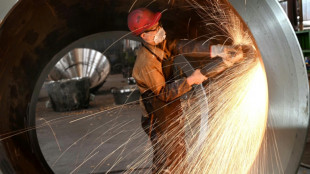 Stocks retreat as US hits Nvidia chip export to China
Stocks retreat as US hits Nvidia chip export to China
-
China's Xi meets Malaysian leaders in diplomatic charm offensive
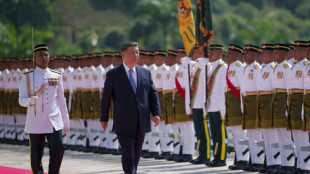
-
 Israel says no humanitarian aid will enter Gaza
Israel says no humanitarian aid will enter Gaza
-
Anxiety clouds Easter for West Bank Christians

-
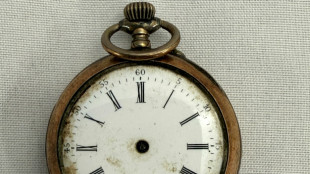 Pocket watch found on Titanic victim to go on sale in UK
Pocket watch found on Titanic victim to go on sale in UK
-
UK top court rules definition of 'a woman' based on sex at birth
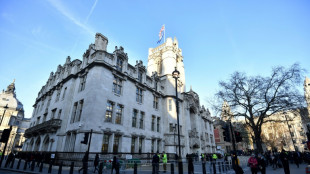
-
 All Black Ioane to join Leinster on six-month 'sabbatical'
All Black Ioane to join Leinster on six-month 'sabbatical'
-
Barca suffer morale blow in Dortmund amid quadruple hunt

-
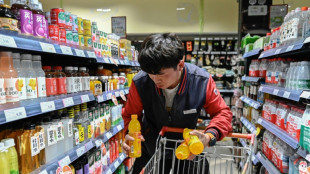 China tells Trump to 'stop threatening and blackmailing'
China tells Trump to 'stop threatening and blackmailing'
-
Iran FM says uranium enrichment 'non-negotiable' after Trump envoy urged halt
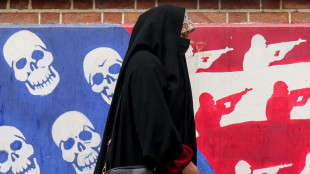
-
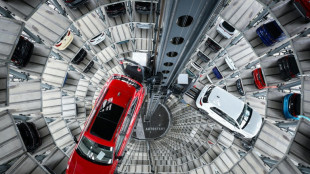 Automakers hold their breath on Trump's erratic US tariffs
Automakers hold their breath on Trump's erratic US tariffs
-
Cycling fan admits throwing bottle at Van der Poel was 'stupid'

-
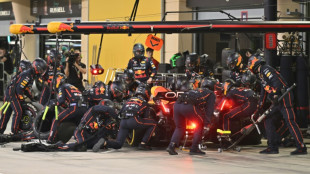 Troubled Red Bull search for path back to fast lane
Troubled Red Bull search for path back to fast lane
-
China's forecast-beating growth belies storm clouds ahead: analysts
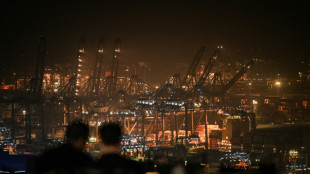
-
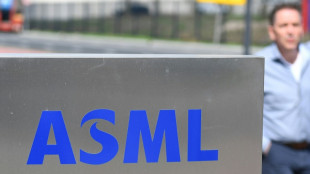 ASML CEO sees growing economic 'uncertainty' from tariffs
ASML CEO sees growing economic 'uncertainty' from tariffs
-
Heineken beer sales dip, tariffs add to uncertainty
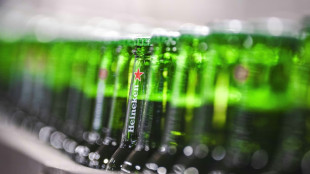

How the EU is responding to Trump's trade assault
Hit by three waves of painful US tariffs since President Donald Trump returned to office, the European Union's response has been a high-wire act, balancing calibrated retaliation with a push for negotiations to avert an all-out trade war.
- In March, Trump fired his first shot against the 27-country European Union with 25 percent levies on steel and aluminium imports;
- He then slapped 25-percent tariffs on all foreign-made cars, in effect since last week;
- And in his biggest move, Trump ordered 20 percent tariffs on all other EU goods among a raft of levies on dozens of countries including China, which came into force Wednesday.
- What steps is the EU taking? -
The EU's approach so far has been think first, then act.
After the metals tariffs hit in March, it gave itself a month to fine-tune a list of US goods to target -- ranging from soybeans to makeup and motorcycles, and weighted towards states held by Trump's Republicans.
EU capitals are to green light this list during a meeting Wednesday. Once approved, the majority of the tariffs will kick in in May, and some in December.
Meanwhile, the EU will let levies dating from Trump's first term -- but currently suspended -- snap back into place in mid-April.
Next will come the bloc's response to the sweeping 20-percent import taxes and tariffs on cars, which could be made public as early as next week.
There has been no public indication of how the EU will respond, but France has led the push with Germany and Austria to target US tech titans if negotiations come to nought.
France and Germany have gone further, pushing the EU to be prepared to deploy its so-called trade "bazooka" -- the anti-coercion instrument.
The new and yet unused tool is designed to punish any country using economic threats to exert pressure on the EU, once diplomacy fails, and gives the bloc greater powers including limiting trade on services.
- What about negotiations? -
What Europe wants above all is to reach a negotiated solution.
"Sooner or later, we'll be sitting at the negotiating table," the EU's trade chief Maros Sefcovic said Monday, while admitting that "engaging the US will take both time and effort."
A quiet unassuming figure, Sefcovic has led the EU's outreach in search of a "mutually acceptable compromise".
He has gone to Washington twice -- in February and March -- and held calls with his US counterparts, Commerce Secretary Howard Lutnick and Trade Representative Jamieson Greer.
EU chief Ursula von der Leyen this week offered a glimpse into what Europe has put on the table so far, revealing it offered Washington a bilateral tariff exemption for cars and other industrial goods. The response was not positive.
Officials privately admit that there has been little progress in the EU's talks with the United States, pointing to an unclear picture of what Trump really wants.
One issue could be whether the bloc is talking to the right people.
Trump's trade advisor, Peter Navarro, appears to be far more influential on the issue than Lutnick or Greer, but EU officials say he has not been a part of the discussions.
- What else might Trump want? -
Navarro, believed to be the architect of Trump's trade offensive, has made it clear he is deeply unhappy with the EU, lambasting a series of "non-tariff" barriers Washington deems unfair.
US officials have set their sights on value-added tax (VAT) but also the EU's food safety and health rules, and its environmental standards.
"Anybody who wants to come to talk to us, talk to us about lowering your non-tariff barriers," Navarro said in a Monday interview.
He has also taken umbrage with the EU's landmark tech laws, the Digital Markets Act and the Digital Services Act, claiming they unfairly target American companies.
The EU has pushed back hard on the VAT and tech claims.
"(We) don't share the US assessment of what constitutes a non-tariff barrier," EU spokesman Olof Gill said Tuesday.
He added European tech rules were "separate" from the tariff discussions. "We will not be conflating the two in our negotiations with the US."
The threat of more duties is far from over. Trump also has the pharma sector in his crosshairs -- a critical industry for the EU, especially Ireland.
A.Kunz--VB

